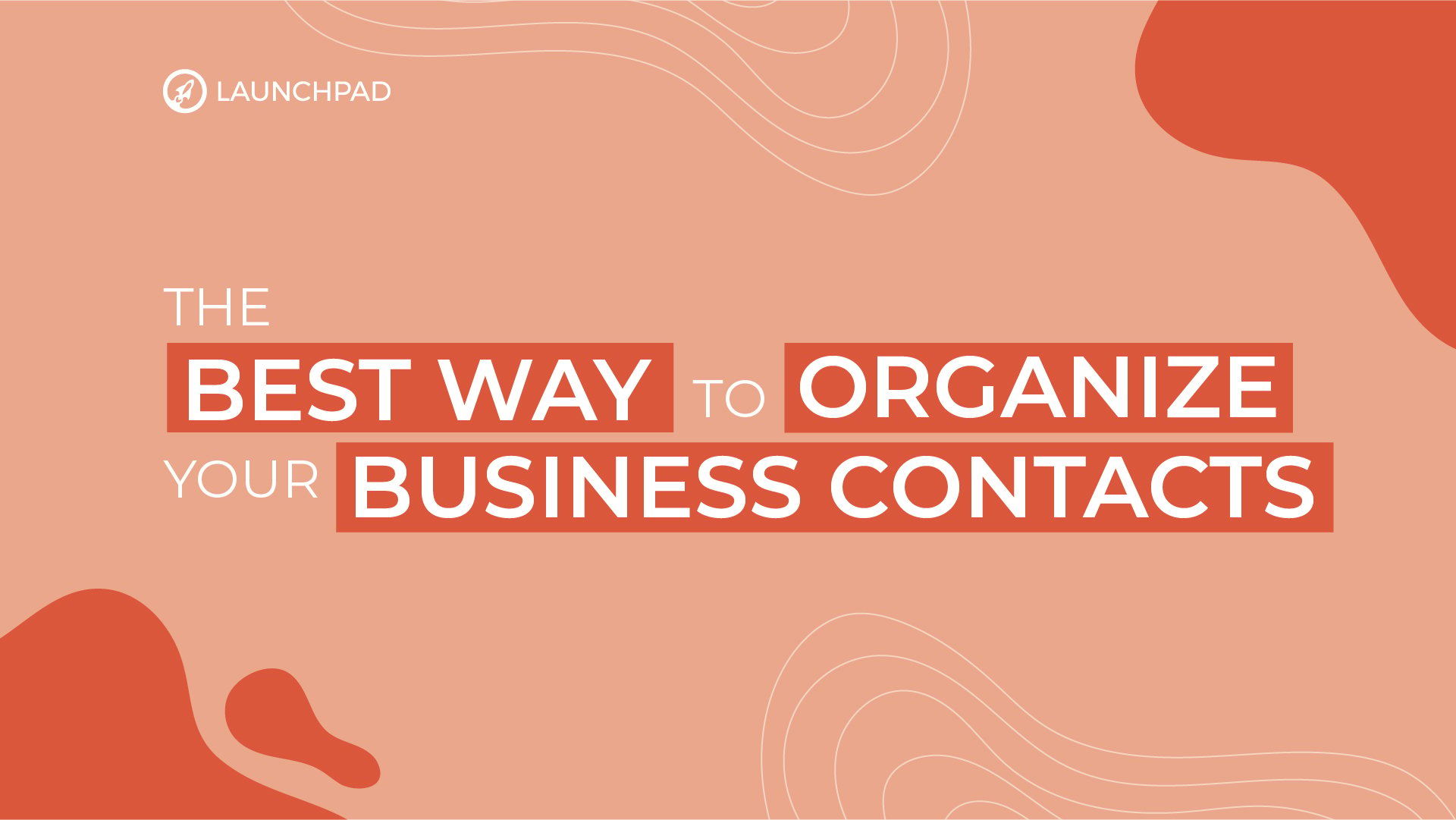
What is the best way to organize business contacts?
With the world moving at a supersonic pace, we naturally try to keep up by making every aspect of our lives efficient. However, in the name of efficiency, we breeze through tasks mindlessly causing work quality to drop significantly.
Many businesses face this problem, especially when it comes to collecting and recording potential business information. Without a guiding hand or efficient training, marketing and sales sometimes miss out on pertinent customer information which then makes it difficult in pinning that customer’s position in the buyer’s journey.
What kind of lead are they? What was their first contact with your company? What was the outcome of your last call with them?
Either you track down someone who has the information, or fight an uphill battle without it.
At the end of this article we show you a powerful free CRM that organizes your business contacts for maximum revenue actualization.
So what is the best way to organize business contacts?
The best way answers:
Who is this person?
You want to be able to put a name to the face.
What's this person's name? How do you contact him? How do you address him?
Remembering all these basic information can sometimes leave an impression on someone. It's just good business to recall who someone is.
What do they do?
You want to know what their day to day is like.
Where do they work? What is their job title? What is their job description?
This way you have some insight into their lives and what a typical day looks like for them. Knowing this information allows you to put yourself in their shoes and empathize with them.
How do they know you?
You want to remember how this person found out about you.
Did you meet them at an event? Did they sign up on your website's newsletter? Did you meet them at a coffee shop? Did they download any offers or signed up to your webinar?
Being able to recall this information allows you to understand what kind of lead/potential customer this person is. You'll be able to tell if this person is likely to do business with you.
What’s important to them?
You want to know why they contacted you in the first place and if you can possibly add value to their lives.
What kind of questions have they asked you? What kind of deals capture their attention? How likely are they to buy something from you?
If you have answers to these you might as well have a golden ticket to their business. You know exactly what their pain points are and can propose solutions to build rapport, or even sell them the idea of doing business together.
Here’s a rubric that helps you answer those questions:
This rubric should be used alongside the tools proposed in the next point.
- Personal and contact info (Who is this person?)
- Name
- Birthday
- Phone Number
- Address
- Website
- Job (What do they do?)
- Title
- Company
- Newsletter Subscriptions (How do they know you?)
- How did they get to subscription?
- Which type of subscription?
- Relationship Managing (What’s important to them?)
- Activity Log in Timeline
- Deals claimed
- Ticket Inquiry
- Marketing funnel status
- Stranger
- Subscriber
- Lead
- Customer
Tools to organize business contacts
1. Notebook
A trusty notebook gets the job done. Cheap, versatile, easy to use, and has been ingrained in human culture for nearly 10,000 years.
After a day of networking and collecting business cards you can and should set aside some time to organize your business contacts. This way information becomes easily accessible.
The notebook may be the barebones minimum, but it gets the job done and is one of the most intimate ways to organize your business contacts. It would be hard not to feel a connection with someone after writing down all their information, calling up people to get to know them a little more, and filling up a notebook with contacts by hand.
Using a notebook shows its limitations when you’re trying to search for information. What happens when you want to look for a specific contact who works in a certain industry and is at the consideration stage of the buyer’s journey? The answer to that is praying that you’ve organized your notebook in such a way that allows that specific filter; very tedious and time-consuming. What would happen if we used technology then?
| Pros | Cons |
|
|
2. Excel Spreadsheets
As we enter the digital age, our norms change dramatically. An Excel spreadsheet is the natural evolution for organizing business contact information.
It’s superior to a notebook because you can now save templates and eliminate the need for organizing a new contact for every page of your notebook; it allows us to immediately put data into visuals and allows us to filter through information, however, we, please.
However excel does have a major shortcoming, it requires a lot of time and effort to master the tool. Besides that, once your contact list grows to be extensive, sifting through the information can become a hassle. It also takes an enormous effort to pull data from a website cleaned and re-purposed into useful, presentable information.
| Pros | Cons |
|
|
Get our Excel Spreadsheet for organizing contacts here.
3. HubSpot's Free CRM
HubSpot’s free CRM does everything on the rubric. Plus, you don’t have to write, rewrite, and edit by hand; you don’t need to spend hours becoming a spreadsheet master; you won’t have to use multiple tools to turn a cold lead into a loyal paying customer.
Look at how easy it is to manually record a contact’s info:
1. Simply click on the orange create contact on the top right
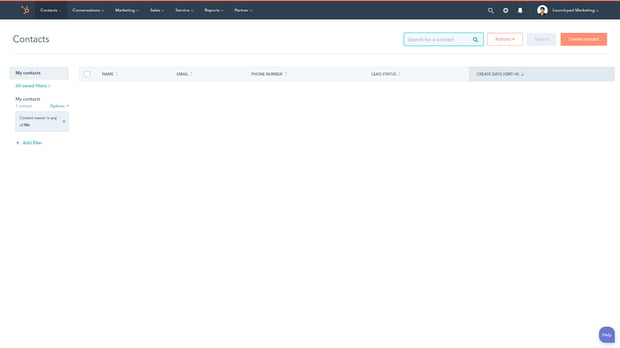
If you look to the left, you'll notice HubSpot allows you to create your own filters so you're able to find that right contact instantly.
2. Fill in their details
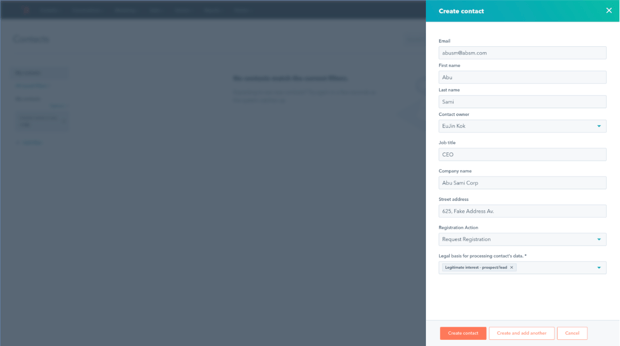
Notice how HubSpot allows you to categorize what kind of lead/customer this person is.
3. And you have a new contact on HubSpot
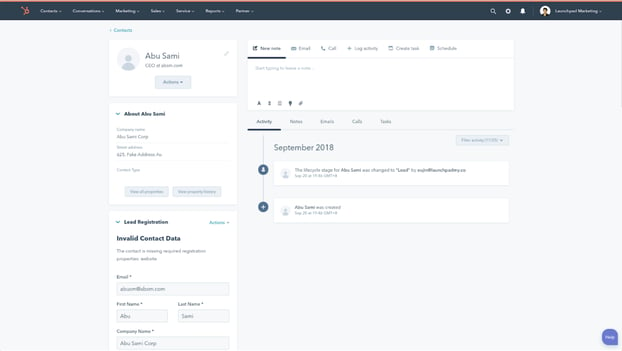
Notice how HubSpot alerts you to missing information and urges you to fix it.
HubSpot also allows you to connect your business email to communicate with your contact without leaving the tab.
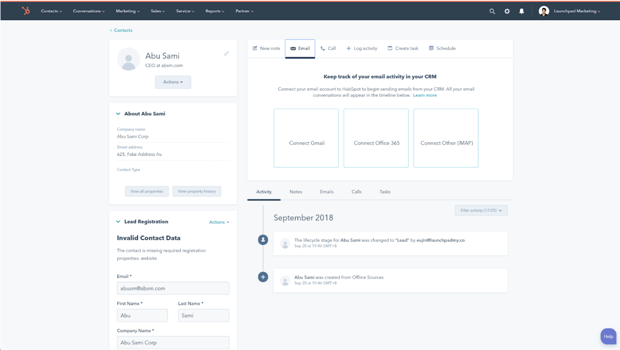
You will always be on top of a situation with your contacts and thinking of how to organize contact information will be a thing of the past.
Once again, this amazing service is free and you can start implementing this in your business today.
If you'd like to learn more about HubSpot or have questions, why not schedule an appointment with us? It's free and we're friendly.



